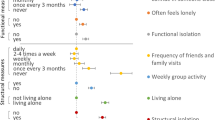Abstract
Background: The aim of this present study is to examine whether overall subjective quality of life and specific domains of quality of life change among homeless adults after they become housed, and if so, what factors predict changes in satisfaction. Methods: The data analysed here were collected through face-to-face interviews with a sample of 485 homeless adults who were interviewed as often as bi-monthly over a 16-month period. Bivariate analyses examined initial differences between three groups: homeless people who did not exit from homelessness; those with an exit from homelessness to dependent housing; and those with an exit to independent housing. Bivariate analyses also examined differences in subjective quality of life before and after an exit from homelessness among the three groups. Multivariate analyses identified predictors of changes in quality of life before and after exit. Results: This study has three main findings. First, homeless people who obtained independent housing had the largest positive and significant improvements in satisfaction with overall quality of life, and in satisfaction with housing, leisure and money. Second, becoming housed was not a predictor of changes in overall quality of life perceived by homeless people, nor in their satisfaction with leisure, clothing, food, and social life. Furthermore, a positive change in housing satisfaction was not associated with all types of exits from homelessness; only a move into independent housing predicted such a change, but a move into dependent housing did not. Finally, of all the covariates included as predictors at baseline, only two variables seemed to consistently predict changes in satisfaction; namely, self-assessed general health and self-assessed self-help skills. Conclusions: This study suggested that becoming independently housed may improve some aspects of quality of life for homeless people, but not others. The results suggest that homeless people prefer to be independently housed relative to remaining homeless or staying in a dependent housing situation, but that independent housing does not necessarily improve other aspects of their lives.
Similar content being viewed by others
Author information
Authors and Affiliations
Additional information
Accepted: 21 March 2001
Rights and permissions
About this article
Cite this article
Wolf, J., Burnam, A., Koegel, P. et al. Changes in subjective quality of life among homeless adults who obtain housing: a prospective examination. Soc Psychiatry Psychiatr Epidemiol 36, 391–398 (2001). https://doi.org/10.1007/s001270170029
Issue Date:
DOI: https://doi.org/10.1007/s001270170029




